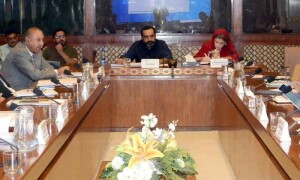**ISLAMABAD**: The All Pakistan Textile Mills Association (Aptma) has urged the government to revisit its agreement with the International Monetary Fund (IMF) regarding the planned cessation of gas supply to captive power plants in the textile sector by the end of January 2025. Aptma stresses that maintaining a steady gas supply is vital for the industry’s recovery and for boosting exports.
The call was made during a meeting with Commerce Minister Jam Kamal on Friday, where an Aptma delegation, led by Chairman Kamran Arshad, highlighted key concerns affecting the textile sector. The delegation emphasized that without uninterrupted gas access, the textile industry would struggle to regain its footing and expand its export potential.
During the meeting, Mr. Arshad outlined several challenges facing the sector, including the looming gas supply cutoff to captive power plants, high electricity costs, rising taxes, and a liquidity crunch. These issues, he warned, could erode the industry’s competitiveness and hinder its ability to grow exports.
A major point of concern raised by the delegation was the withdrawal of sales tax exemptions on locally sourced materials under the Export Facilitation Scheme (EFS) introduced in the Finance Act of 2024. While imported materials remain exempt from taxes, locally procured inputs are now subject to an 18% sales tax. Additionally, delays in tax refunds under the FASTER system have placed further strain on exporters, prompting some to shift towards importing materials, which could destabilize the domestic supply chain.
In response, Commerce Minister Jam Kamal assured the Aptma delegation that the government remains committed to supporting the textiles and apparel sector. He acknowledged the sector’s vital role in Pakistan’s economy and socio-economic development, emphasizing that the government would take all necessary steps to ensure the sector’s sustainability and growth.
“The textiles and apparel industry is an established backbone of our economy, and the government is fully committed to its growth,” he said. The minister also expressed confidence that, through collaborative efforts and supportive policies, textiles and apparel exports could be significantly increased.
Mr. Kamal encouraged the industry to not only strengthen existing markets but also explore new ones, as well as to diversify into value-added finished products. “I will personally engage with the relevant authorities to find practical solutions for these challenges,” he assured the delegation.



